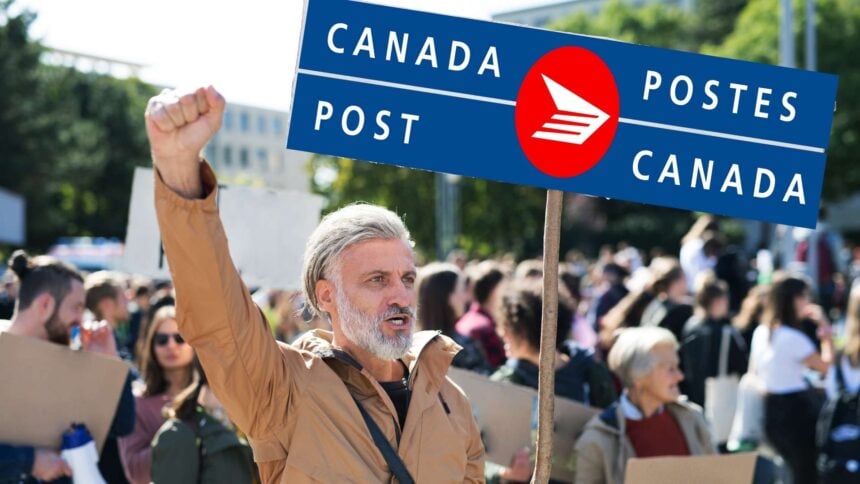Canada Post Ends Nationwide Strike, Delivery Resumes after rotating walkouts
Canada Post has restarted service after the union shifted from a national stoppage to rotating strikes.
Mail and parcels are moving in areas without pickets, though delays are expected as the network clears backlogs. Rotations began at 6 a.m. local time on Saturday, with locations changing over time.
Canada Post says it will accept, process, and deliver in unaffected areas, while customers in strike zones could see pauses.
The company plans to post updates on where rotations are active. Early coverage shows some facilities already back in motion, but service standards remain uneven.
Expect priority to go to items already inside the system before new shipments.
CUPW leader says Ottawa made ‘mockery’ as strike shifts to rotating
CUPW says nationwide walkouts will switch to rotating strikes starting at 6 a.m. local time on Saturday so some mail and parcels can start moving again. The union calls this a tactical shift while talks remain stalled.
In a fresh statement, CUPW said government intervention “made a mockery of the bargaining process,” arguing it boxed talks in and encouraged Canada Post to hold firm.
The union is still reviewing the company’s latest offer and says more details on which locals rotate out will come next.
Ottawa has welcomed the move to rotations, saying it should ease delays while negotiations continue that does not settle contract issues, but it reduces the pressure on households and small businesses that rely on regular delivery.
Our take, rotating strikes lower the heat but do not fix the core gap. Real progress would show up as a tight bargaining schedule and short joint updates on specific clauses.
Until we see that, expect service to improve in some areas and pause in others, with the pattern changing day by day.
Canada Post union and Ottawa set for crucial meeting as strike continues
CUPW says it will meet in Ottawa with Joël Lightbound, the minister responsible for Canada Post.
The union says this will be its first in-person meeting with him since the latest offer was tabled, and it plans to raise job security and how any changes would be rolled out.
The sit down is expected to happen today.
A short joint note after the meeting and a set time for the next bargaining session.
If both appear, that is a sign the process is moving. If the readouts are separate and cautious, expect the strike to continue while talks grind on.
Canada Post strike enters day eleven: Local union says talks were silent for 45 days
A local union leader in Fredericton says the two sides barely spoke before the latest offer.
Sean Oldenberg, president of the CUPW Fredericton branch, told Global News that Canada Post did not talk directly with the union for 45 days before Friday’s proposal.
In his words: “They have not been dealing with us.” He also argued the company is leaning on government reviews instead of bargaining at the table, and that the new offer feels like earlier terms with fresh rollbacks.
Canada Post says the package is the most it can afford while keeping good jobs and benefits over the long term. The union plans a fuller response after it reviews the legal text.
A local business owner in Fredericton, Chad McGary, said he has moved most of his shipping to other carriers after past disruptions.
His point was simple: uncertainty costs money, and small businesses feel it first.
If Oldenberg’s 45 day gap is accurate, that silence is the real problem to fix.
Progress usually starts with a tight schedule, a small list of issues, and people in the same room.
A workable bridge would pair wage language with clear rules on job security and how any delivery changes would be applied.
If both sides can lock those pieces, the rest should follow. If not, the damage to trust and customer habits grows by the day.
Small Businesses face the most risk if the strike drags on
Independent retailers and service firms are bearing the brunt of the stoppage as cash flow ties up in late invoices, returns, and warranty parcels.
The Canadian Federation of Independent Business warns that nearly two thirds of small companies could abandon Canada Post if the disruption persists, and notes that 13% already stopped using the carrier after the last strike.
Many owners say they cannot pass along higher fulfillment costs without losing sales, especially heading into the holiday build-up.
Shifting to private couriers offers speed but at a price. Higher pickup fees and rural surcharges can erase thin margins, while remote communities still depend on the postal network for reach.
Recent reporting shows more merchants moving volume to competitors when reliability wobbles, a trend that accelerates during labor uncertainty.
That migration advantage grows with each additional day of disruption.
Owners are improvising short-term workarounds, from curbside pickup to local bike couriers to consolidating shipments at cross-border warehouses, but these fixes are patchy and hard to scale.
The math has also gotten tougher after five provinces lift minimum wage on Oct. 1, which raises staffing costs even as shipping choices narrow.
Business groups are pressing for a negotiated timeline that restores predictable delivery windows before peak season demand fully arrives.
Postal workers keep up rallies as Canada Post strike hits day 10
Rallies rolled on through the weekend as the Canada Post walkout hit day 10, with CUPW locals staging pickets and outreach events in multiple cities and planning more MP office visits early this week.
Organizers describe the actions as steady rather than massive, designed to keep pressure on negotiators and visibility high while formal talks remain quiet.
In Nova Scotia, striking carriers have focused on lobbying federal representatives, part of a coordinated push to frame the dispute around service standards and community access rather than wages alone.
Video from local media shows workers pressing MPs on delivery frequency and post office footprints.
National labor leaders continue to appear alongside postal workers, a show of solidarity that CUPW hopes will stiffen political resolve against deep cuts to the network.
The Canadian Labour Congress amplified Parliament Hill demonstrations last week and has urged allies to keep turning out until a deal is reached.
13.59% isn’t the whole story: why CPC’s ‘bigger’ offer feels smaller
The corporation says its latest proposal would lift pay by a compounded 13.59 percent over four years while keeping core benefits and a cost-of-living allowance.
But several moving parts make that raise feel thinner to many workers.
First, a cash sweetener that featured in earlier packages is gone. Canada Post acknowledges the signing bonus has been removed, citing a deteriorating financial picture.
Second, the offer lands alongside a government directive that pushes structural changes to how mail is delivered.
Ottawa has authorized flexibility in delivery standards and frequency and a broader shift to community mailboxes.
CUPW argues those changes could shrink hours and erode routes, which would blunt the effect of the base-pay increase on take-home income.
Third, the union says the package reintroduces concessions it has already rejected and adds new rollbacks.
In a bulletin, CUPW called the proposals “worse,” and said it will take time to comb through the hundreds of pages of language before detailing specific objections.
The union’s message is that compensation cannot be separated from job design and service guarantees.
Canada Post union rejects latest contract offer calling it a step backward
CUPW dismissed Canada Post’s Friday proposals as a step backwards, saying the package is weaker than what members already rejected and fails to address core issues raised over the summer.
“The offers are worse,” the union said in a statement, adding that it will take time to scrutinize the documents.
Local coverage of the union’s response echoed that view, noting CUPW’s claim that the offer includes less than the terms turned down in August and arrives after weeks of waiting.
The union says it must review hundreds of pages of legal language before detailing specific objections.
CUPW also argued that Canada Post used the government’s recent reform directive as cover to push rollbacks, characterizing the move as “major steps backwards.”
Canada Post says its proposals reflect financial constraints and are designed to support a sustainable service over the long term.
Negotiators remain in contact, but the strike continues while the union completes its analysis and prepares a formal counter. The timetable for the next bargaining session was not immediately clear on Saturday.
Lucky Duck Mail Club spreads kindness during the postal strike
A small Ontario project is turning frustration into connection. The Lucky Duck Mail Club, a St. Catharines based snail-mail subscription, is leaning on notes of encouragement and original art to keep spirits up while normal deliveries are disrupted.
Each monthly bundle typically includes a letter, a 4×6 illustration, and a quote, a format the creator pitches as a reminder to slow down and stay in touch.
Recent coverage highlighted how the effort grew out of one person’s resolve to keep mail magic alive, with founder Kiki Klassen previously taking hours to hand-deliver envelopes around nearby communities when service faltered.
The message now is patience and kindness until operations normalize, with the club’s audience sharing prompts and reflections in the meantime.
The initiative underscores how customers are improvising around the outage while trying to preserve the ritual of receiving something tangible.
For followers abroad, the project offers an international tier so letters can still move even if domestic routes are constrained.
It is a tiny slice of good news in a tense moment, and a reminder that loyalty built through thoughtful service can endure beyond a stoppage.
Canadian postal workers rally as strike enters ninth day
Postal workers and supporters rallied Friday as the walkout reached day nine, with union locals keeping picket lines visible after midweek demonstrations in Toronto and a Parliament Hill gathering signaled broader labor backing.
Events earlier in the week drew crowds outside MP offices and downtown sites, and organizers say actions will continue through the weekend if talks fail to gain traction
Allies from other unions have joined CUPW members at rallies, underscoring the dispute’s political stakes and the union’s message that the postal network is a public service worth protecting.
A Toronto day-of-action midweek brought labor and community groups to the line, while an Ottawa rally drew national labor figures.
CUPW’s public statements continue to frame the fight around service standards and community access, not only wages.
Operational ripples are widening beyond Canada.
The U.S. Postal Service has suspended its delivery-time guarantee for Priority Mail Express International parcels headed to Canada, warning customers of potential delays while the strike persists.
That adds to uncertainty for cross-border shippers heading into a heavy promotional calendar.
Roughly 55,000 workers are off the job, and pressure is building for a negotiated path that stabilizes service without sacrificing the network’s reach.
Canada Post tables new global offers with 13.59% wage gains
Beyond the headline pay package, the latest offer sketches how Canada Post would reshape the network and workforce.
The corporation seeks to remove a clause in the Urban agreement that designates 493 corporate post offices as off limits for network changes, saying the change would let it rebalance resources toward communities with greater need.
It lays out a workforce adjustment process that leans first on upcoming retirements, then voluntary departure incentives of up to 78 weeks of base pay.
If reductions go further, seniority-based bidding and bumping would apply before any layoffs.
Laid-off employees would retain recall rights for two years and could receive a salary top-up during that period.
The company also proposes temporary adjustments to “job security for life” provisions to complete the transition.
Canada Post offer more flexible staffing for weekend parcel surges
Canada Post is pitching weekend-focused staffing to stabilize parcel delivery during promotions and holidays.
The plan centers on part-time roles with guaranteed hours and access to health and pension benefits, aimed at covering surges without heavy overtime or spillover into Monday.
Management says flexible crews could shorten delivery windows and make service more predictable for ecommerce shippers.
Any headcount reductions would start with attrition and voluntary departures, with layoffs described as a last resort during the transition.
The company also wants a more flexible delivery model to better match demand. Parcels revenue fell 36.7% year over year in the second quarter as volumes dropped 36.5%, contributing to a $407 million loss before tax.
Canada Post argues that weekend capacity would help win back volume once operations normalize.
Flexible weekend capacity at Canada Post could help narrow the reliability gap that emerged during the labor dispute. It also intersects with broader wage and cost dynamics in the economy, including recent minimum wage changes.
Earlier this year, Air Canada flight attendants rejected a wage deal before the dispute moved to mediation, a reminder that compensation, scheduling, and staffing flexibility often travel together in high stakes negotiations.
Union says Canada Post is not listening after new offer lands
Canada Post presented new “global offers” to its two Canadian Union of Postal Workers bargaining units on Oct. 3, pitching the package as a path to modernization that still respects employees.
The company said in a press release: “The offers enable the company’s modernization while balancing its financial realities with fairness and respect for employees.”
The proposals cover both urban operations and rural and suburban mail carriers, and arrive as a nationwide strike continues into a second week.
In a bulletin Friday, the union said Canada Post is “not listening” and accused the employer of recycling elements workers had already rejected, with added concessions the union says would weaken protections.
CUPW said its negotiators will study the documents and respond, but the early read is that the new language does not bridge the gap on wages, staffing, and delivery standards.
The offer lands after weeks of rising pressure and a turbulent year at the postal operator.
In mid September, Canada Post signaled a new approach to its union negotiations following a summer vote that turned down earlier offers.
Ottawa has urged both sides to table ratifiable agreements, stressing the need to stabilize a service that millions of households and businesses still rely on even as letter volumes fall.
At the center of the dispute are pay, job security, and the shape of delivery. CUPW has pushed for full-time job protections and wage increases that keep pace with costs.
Recent union proposals called for a total 19% raise over four years, along with limits on expanded part-time work and safeguards for health and safety.
Canada Post, which has posted steep losses in recent years, argues it needs room to redesign how work is organized in order to control costs and compete in parcels, while minimizing the impact on employees.
What changed in the offer
Canada Post says the latest package keeps “key items for employees” while aligning operations with today’s delivery needs.
The company frames it as part of a broader renewal effort aimed at returning the Crown corporation to financial sustainability without taxpayer bailouts.
CUPW counters that the draft still falls short on wages and would make it easier to reshape routes and schedules in ways that erode service quality and job security.
The union also objects to what it describes as new rollbacks tucked into the legal wording.

















